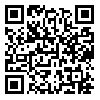Volume 15, Issue 3 (2023)
Res Med Edu 2023, 15(3): 1-3 |
Back to browse issues page
Download citation:
BibTeX | RIS | EndNote | Medlars | ProCite | Reference Manager | RefWorks
Send citation to:



BibTeX | RIS | EndNote | Medlars | ProCite | Reference Manager | RefWorks
Send citation to:
Moradi A, Sheibani Z, Sanagoo A, Jouybari L. Metaverse Applications in Medical Education. Res Med Edu 2023; 15 (3) :1-3
URL: http://rme.gums.ac.ir/article-1-1350-en.html
URL: http://rme.gums.ac.ir/article-1-1350-en.html
Department of community Health Nursing, School of Nursing and Midwifery, Golestan University of Medical Sciences, Gorgan, Iran , akramsanagoo@gmail.com
Abstract: (2363 Views)
Learning and teaching through personal computers have come a long way (1). Over the past two decades, Friedman has described the concept of the "amazing medical education machine" and how medical education can grow incrementally in space, time, and content through the appropriate use of this technology. With the advent of the Metaverse, this amazing medical learning machine has now become a reality. The Metaverse is a combination of "meta" and "universe" that describes a virtual environment connected to the physical world (2). In educational concepts, Metaverse is a term used to describe a variety of pervasive technologies, including virtual reality, augmented reality, or mixed reality, which are used to advance education and learning practices (3). The use of Metaverse in medical education offers new technological and educational capabilities in improving the abilities of health care professionals in patient care, medical knowledge, teamwork, diagnostic reasoning and critical thinking (4, 3). For trainees, with the help of Metaverse, a headset device was used to place them in the space and conditions similar to their working environments, similar to inside the room and next to the patient's bed. This new format allows teams of learners to interact with patients, peers, and educators while simultaneously visualizing the patient's clinical findings, imaging, and laboratory studies at the bedside (2). In another study, the research team developed a multitasking virtual reality application for cardiac arrest resuscitation. This program allows four interns to be in a "virtual room" and collaborate to care for a cardiac arrest patient. In short, medical education has also grown and developed according to new technologies. We need to know how to best use these unique features of the Metaverse in learning design and the overall future of medical education and therapy (1, 5). Metaverse can be used to simulate real-world scenarios, provide interactive feedback and personalized learning based on the needs and preferences of individual learners. This tool can be used to simulate real environments such as hospitals, operating rooms or natural environments, which can help medical students develop their skills and knowledge in a safe and controlled environment To develop (3,4). Research results show that learning based on clinical scenarios simulate real life and continuously improve learning results. Metaverse can improve experiential learning through the integration of effective educational approaches, such as problem-based learning, game-based learning, and scenario-based learning (6). The development of virtual reality simulation technologies in health care systems can be used not only in surgeries, but also in diagnosis, rehabilitation and education. The experiences of using Metaverse should be expanded so that health care providers and professors can understand the necessity of using it (5, 7). He pointed out the limitations of the Metaverse, weaker social connections and the possibility of violating one's privacy. In addition, committing various crimes in cyber space may happen due to the anonymity of people. The following suggestions can be used for educational use of Metaverse: professors should carefully analyze how students understand Metavers. also, educational Metaverse platforms should be created to prevent misuse of students' data (8).
Type of Study: letter to Editor |
Subject:
Educational technology, e-Learning,Virtual Education
References
1. Kala N. Revolutionizing Medical Education with Metaverse. Int J Sci Res Comput Sci Eng Inf Technol 2022;8:26-32. [DOI:10.32628/CSEIT22844]
2. Tlili A, Huang R, Shehata B, Liu D, Zhao J, Metwally AHS, et al. Is Metaverse in education a blessing or a curse: a combined content and bibliometric analysis. Smart Learning Environments 2022;9(1):1-31. [DOI:10.1186/s40561-022-00205-x]
3. Almarzouqi A, Aburayya A, Salloum SA. Prediction of user's intention to use metaverse system in medical education: A hybrid SEM-ML learning approach. IEEE access 2022;10:43421-34. [DOI:10.1109/ACCESS.2022.3169285]
4. Mahajan AP, Inniss DA, Benedict MD, Dennis AA, Kantor T, Salavitabar A, et al. International mixed reality immersive experience: Approach via surgical Grand Rounds. Journal of the American College of Surgeons 2022; 234(1):25-31. [DOI:10.1016/j.jamcollsurg.2021.09.011]
5. Suh I, McKinney T, Siu K-C. Current Perspective of Metaverse Application in Medical Education, Research and Patient Care. Virtual Worlds 2023;2(2):115-128. [DOI:10.3390/virtualworlds2020007]
6. Hilty DM, Alverson DC, Alpert JE, Tong L, Sagduyu K, Boland RJ, et al. Virtual reality, telemedicine, web and data processing innovations in medical and psychiatric education and clinical care. Academic Psychiatry 2006;30:528-33. [DOI:10.1176/appi.ap.30.6.528]
7. Moro C. Utilizing the metaverse in anatomy and physiology. Anatomical Sciences Education. 2023;16(4):574-81. [DOI:10.1002/ase.2244]
8. Kye B, Han N, Kim E, Park Y, Jo S. Educational applications of metaverse: possibilities and limitations. Journal of educational evaluation for health professions 2021;18: 1149230. [DOI:10.3352/jeehp.2021.18.32]
Send email to the article author
| Rights and permissions | |
 |
This work is licensed under a Creative Commons Attribution-NonCommercial 4.0 International License. |




